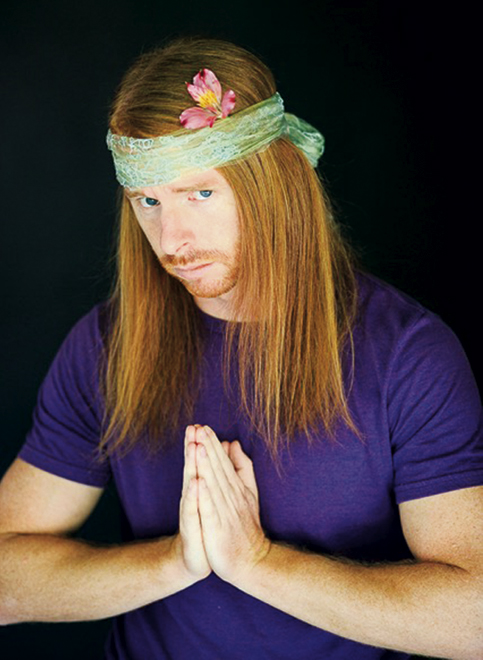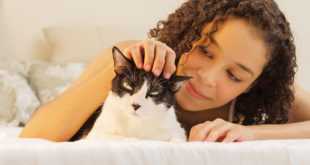
by Janae Jean and Spencer Schluter –
For the first in our new series of interviews for Conscious Community Magazine, contributors Janae Jean and Spencer Schluter interviewed JP Sears. JP is an emotional healing coach, teacher, author, and prominent YouTube personality who speaks at engagements and retreats around the world. His YouTube channel has over 500,000 subscribers, and his videos have garnered millions of views. JP believes that humor is healing, and his humorous “Ultra Spiritual” video series reminds us to laugh at ourselves.
You can listen to the full interview with the podcast player at the bottom of this article or subscribe to our podcast on iTunes, Google Play Music, or Stitcher.
 You’re in Costa Rica now, are you moving to Costa Rica or working there?
You’re in Costa Rica now, are you moving to Costa Rica or working there?
My girlfriend and I are splitting time between her place here in Costa Rica, and my place in Charleston, South Carolina. That’s what we’re doing for the time being. I don’t envision myself moving down here permanently, but right now we’re in a phase of splitting time, which is definitely going well.
Was there someone in your past who inspired you to become a life coach or emotional healer? What brought you into your work?
I think there is a couple motivators. There’s definitely a person who inspired me, my original mentor, a guy named John McMullen, and his organization is JourneysOfWisdom.com. I was very inspired by how I saw him working with people, and how he was just a very wise peaceful person. So that was a big motivator. Then the other motivator for me was I started projecting my need for healing on to other people and just developed the passion, “I want to help other people heal.” Then working more with John McMullen I started to realize “Yeah, I want to help other people heal because I really need healing, I really need self-work.” So, in the beginning, I was just projecting my need for it onto other people.
In your videos you reference Jung a lot, where did you discover his work and how does that influence you?
I was born and raised in Ohio, and I lived there until I was let’s say 23. When I was about 21 maybe 22 a friend of my girlfriend’s at the time mentioned to my girlfriend, “Hey, my father in law is taking these amazing workshops with this really weird guy in Columbus named John McMullen. I know JP is getting into the weirdo spiritual realm, maybe he’d like to check him out.” I did that, I checked John out. My first class with him was a three-day workshop and it was absolutely life-changing. How the life-changing part showed up is I had my world-view shattered, I had my view, of who I thought I was, shattered. I was able to shed my façade of being strong and stable and become vulnerable for the first time in a long time. I got to crack the shell that had been around my heart. That was definitely life changing and it was the initiation of what is continuing to be ongoing work of connecting to my heart and doing my best to live from my heart. The other aspect of how that has been life-changing is the 15 years or so of emotional healing coaching work that I’ve been doing with people is been principally shaped by my experience in John McMullen’s teaching and lessons. It’s been a huge career asset in addition to my personal life as well.
Do you feel like the universe put you here for a reason? Do you have a higher purpose or a mission in life?
I do. I feel very blessed to have a sense of connection with purpose, and right now in a few short words how I would articulate my purpose as “connection and creativity.” Those two words are pretty synonymous, but they both resonate with me. Part of the connection element of the purpose is connecting with people to help them help themselves heal their hearts and find more meaning in their lives. The creativity aspect has really come alive in the past few years, where creativity becomes a big hand that I reach out to connect with people. The case in point, my comedy videos, which I really feel are the first ventures into the realm of creativity I’ve had in my life. Therefore, the creativity of my videos helps me reach millions of people and connect to millions of people. Long story short, I feel very blessed to feel on purpose.
In reference to your TED Talk on the virtues of weirdness, what do you believe is the first step in embracing our weirdness? How do we encourage others and ourselves to go into that space with our lives?
I personally feel the first step to embracing our weirdness and our authenticity, which is on the other side of the bridge of weirdness, is a willingness to be uncomfortable. It takes courage to be uncomfortable. What I mean by uncomfortable is when we step into our weirdness. My experience is that we can feel different; we can feel afraid people can’t accept us; we can feel ashamed that we aren’t like everybody else. Those are very natural human reactions, and that’s largely what drives children to try to conform and fit in at school. That serves us maybe at school, but becomes a prison later in life. Once we become willing to say like, “Yeah, I feel afraid expressing something that is unique to me, and I’m scared, and I’m worried, and I’ll do it anyway because I’m willing to feel those feelings.” As opposed to an unwillingness to feel those feelings means, in my opinion, that we’re afraid to feel afraid. Therefore, we not only avoid our fear, but we avoid doing what we believe will provoke the fear. And if that means being authentic and unapologetically weird, then we avoid doing that because we’re unwilling to fear the fires of our emotion.
From your website you have the quote, “perhaps our ability to laugh at ourselves and not take ourselves too seriously is what increases our spiritual growth.” What sparked you to begin using comedy or have you always used comedy? How has that served you? Has it gotten in the way of your serious practice?
In my personal life, I’ve always used comedy. Much like any other comedian, to categorize people, my inner comedian as a child was developed because of pain. I used comedy to escape my pain and to escape my insignificance, or my feelings of insignificance. Where I found if I can make someone laugh, then I feel significant for two minutes, maybe three minutes, then I gotta make someone laugh again. You get a lot of practice making someone laugh, but there’s that two-minute rush of feeling significance, which was my escape mechanism to hit the eject button from my emotions that made me feel insignificant. So as a child I used comedy to essentially escape myself. Then as an adult in recent years I’m doing my best to use comedy not to escape myself but to embrace myself and understand myself and embrace my pain and heal rather than run from it. Therefore, on the professional level about two and a half years ago which would have been October 2014, that’s when my comedy was released onto the professional world, and I did that through my first comedy video called “How to Be Ultraspiritual.” Before that I had very intentionally kept comedy and humor out of my professional life because I thought it would discredit me; I thought it would be bad for business, and really all that meant is, I was trying to be someone I wasn’t. I was trying to conform to who I think I’m supposed to be, and it was a form of self-rejection. Once I no longer could betray myself I brought comedy, and it turned out to be really good for business. That’s really a symptom of it was me being willing to be more myself. Life always supports us when we are being more ourselves.
Do you feel like the creative fields of art, music, and comedy attract damaged people? How do you see creativity as part of the healing process?
I do think it attracts people who need healing. I have a perspective that there are two types of people types of people in this world, those who are wounded and those who are in denial that they are wounded. Being wounded and therefore needing healing is absolutely part of the human condition. It affects all of us from my perspective. Art, creativity in whatever form the art is, I don’t think that’s the only way to heal, but it’s a powerful tool of healing because when we’re in a creative space I believe we’re tapping into and connecting with the source where creativity comes from. Creativity comes through us, I don’t think it’s generated by us. If we’re in a space of doing a painting, making music, making a video, doing some writing, then maybe without us knowing it we’re unkinking the umbilical cord that connects us to a power greater than us. Ultimately being connected to a power greater than us is incredibly healing, connection is significantly healing. In a way we kind of give ourselves powerful medicine that we need without us really knowing that we’re giving it to ourselves when we’re being creative. It sounds artsy fartsy and kind of ultra-spiritual, but I think when we have that experience that feels true to me.
Where does your “Ultra Spiritual” alter-ego come from? Does it come from you evaluating yourself?
I wish I could say it comes from someone else, but…guilty…it comes from me. I started the “spiritual path” when I was in my early twenties and lived in southern California from the time I was 23. I was very immersed in the “spiritual culture,” and it was wonderful, it really helped me. It took me many years to develop the self-awareness to realize how I was really losing myself on the path to finding myself and realize how some of my spiritual practices and spiritual philosophies were incredibly laced with the agenda of gratifying my ego. The Ultra Spiritual alter-ego is very much the part of me that is looking to egoically gratify myself through “spiritual pursuits,” hiding my ego agenda behind noble looking hiding spots. It’s really a form of self-therapy where I shine the light of awareness on things I’ve done, things I do, so that I can be a little more self-aware and a little more transparent and authentic.
Do you think that the consumer side of the consciousness movement, the consumption of products that are marketed to people in search of higher consciousness, is part of reaching a higher level of consciousness or do you think that it is a diversion that turns spiritual growth into consumer culture?
It’s a natural step as long as we step into it then step out of it after a little bit of time. It becomes a detriment when we step into the spiritual materialism, I would call it the spiritual egoism, and then we get stuck there. The term is “spiritual bypassing,” I think that is so natural on the spiritual path. It’s one of the beginning stages; it’s a stage of spiritual adolescence, and that’s ok. I think we can forgive ourselves for not being perfect. It takes some intentional self-awareness to recognize when we are in that stage of spiritual bypassing, spiritual materialism, so we can step out of it. If we don’t have the self-awareness to recognize that just because we’re calling all this stuff “spiritual” doesn’t necessarily mean it’s spiritual. Things that I call spiritual can actually work against my spirituality. They can make me more disconnected from myself, more disconnected from my search, more disconnected from other people. If we don’t recognize that we can be stuck in a very immature phase of self-development while thinking that we are soaring into greater stages of self-development and spirituality.
Since we’re from Conscious Community Magazine, what does that term mean to you?
For me what conscious community means waking up beyond where I was yesterday. To me that’s the path of consciousness. It might mean now I’m seeking out a more holistic care provider. For others, it might mean I’m going to a meditation class. For others, it might I’m mean going to a therapist or it might mean I’m doing scream therapy in the woods. The path of consciousness really just implies we’re on this infinite journey of waking up more. How we’re waking up doesn’t necessarily have to look one specific way, it’s just more awake than we were yesterday. Community is a very cool part of that. I think we all need a tribe to support us. There’s a reason why there is more than one human being on this planet, and I think it’s because we need each other. So in order to keep waking up more so that we can have a deeper sense of meaning in our life I think a community or a tribe is very important to that. “Conscious Community” means helping each other and supporting each other as we wake up.
Where do you feel the line is between helping other people and forcing other people when they don’t want it? What is your responsibility to save someone else from themselves?
There’s a reason why other people have their own free will, and that’s because they need their free will. They don’t have our will they have their will. It’s ideal to be aware that we can violate people under the guise of trying to help them. We can invade them physically and psychologically trying to get them to live life our way. Trying to get them to have their point of view our way. I think not only is that invasive but I think that is a terrible catalyst to change. We all know typically the more we tell someone to do something the more defiant they get. It’s not only invasive and violating, it’s a terrible strategy to actually help someone. My experience is coming from a place of invitation, inviting people to consider helping themselves is much better than telling them to help themselves. Coupled with that, when we come from a place of inviting people to consider new perspectives we have to be willing to feel our own fires of helplessness because a lot of them will say no. A lot of them won’t be ready, especially if they didn’t ask us for help. Everybody in the healing and helping community knows how hard it is when there’s someone we love who’s not willing to change for their own betterment. That’s our own self-work, to feel those emotions, to feel our own fires of what it feels like to be helpless. We have to be willing to sink into the vulnerability of our own helplessness, or else, we’ll drive ourselves nuts.
How did you get into YouTubing? How did you start?
I started my YouTube channel April of 2013, and like you said, they were serious videos in the beginning for about the first year and a half. October of 2014 is when I started to do the first comedy videos. How I got into starting my YouTube Channel is, I just wanted to do a couple things, one I wanted to have another stream of getting myself out there to essentially get more clients into my business. So it’s like, “O.K., yeah, I’ll make some YouTube videos to increase my visibility, and maybe get some clients out of that.” Secondly, it also just feels good to me to voice my perspectives on given topics and hopefully help a few people along the way.
Is your YouTube career, the public persona, and the media career secondary to your career as a coach and a healer? Are they interdependent or is it your primary focus?
It’s been a lot of shifting, this past January of 2016 I gave up my one-on-one client practice. For a while before that there was shifting, business opportunities, and a lot of purposeful time being devoted to things that were coming up because of the YouTube and the exposure. I went from five days a week working with clients, to four days a week, and then from four days a week to three days a week, and then to two days a week, and then to surrendering the client practice. I think I had been being called to let go of the client practice for a while. It took me a while to actually listen. It’s hard to give up a great thing. It’s easy to give up on terrible things, but my client practice was great. The past seven months or eight months has been much more devoted to fertilizing the opportunities that have to do with speaking or performing. Putting a lot more prioritization into videos, as well as being able to work on various projects that I have coming down the pipeline.
With the videos, how much do you do yourself or do you have a team now?
I do it all myself. Everything from the scripting, the filming, the editing. I really enjoy the creativity that goes into each element. The writing is a beautiful part of the creative process. The filming certainly is a beautiful part and the editing is also a creative dimension. I’m a one man show with the videos.
We’re you entirely self-taught in how to make YouTube videos?
When I started making YouTube videos in April of 2013, I was actually looking up YouTube videos on how to make YouTube videos, looking up YouTube videos on how to use iMovie editing software. There was definitely a self-taught learning curve.
At this point you’ve suspended your one-on-one coaching practice. Would you ever consider doing it again if you had some celebrity client that wanted to work one-on-one with you?
No. That really just doesn’t light my heart up. I’m really not impressed by celebrity status. They’re another human being. I really wouldn’t be seduced off the path of my heart just because of celebrity status.
Not even Donald Trump?
Well…ok…the guy needs it, and maybe it would help everybody else out.
He needs to go the jungle and drink some ayahuasca.
Yeah…one hundred percent.
What inspired you to write your book? Did Sounds True approach you or did you always have that in you? Did you just want to get that whole character out and get his whole soul into paper?
The idea came about when Sounds True approached me. I always had it in the back of my mind like, “One day I’ll write a book when I’m an old man sitting by the fireplace,” The idea of writing a book from a comedic perspective that never crossed my mind until Sounds True approached me, and we had discussions. They were like, “We’re interested in basically you, in character, writing a book.” That just lit up my heart, that was a yes right from the get go. Which scared me out of my mind, “I don’t know how to write a book!” But I definitely felt it in my heart, “Yes this excites me, it feels very purposeful.” It felt very creatively stimulating and also from my heart’s perspective of reaching out and connecting with people. Being able to use the language of comedy to provide deeper perspectives for consideration. I had been doing that with videos but the book is another way of reaching people.
Have you been doing the whole book tour thing, going around promoting it?
Yeah, from March until the middle of June there was a lot of book touring.
When you’re doing your book tour events are they pretty similar to your normal speaking engagements?
I found it very enjoyable. What I would typically do was a blend of standup comedy, standup authenticity, just speaking sincere messages from my heart. And then also blended with a little bit of Q/A. That was a great experience. It would bore me to death to just show up somewhere and read a few pages out of my book. The book is written, so let me talk with this audience in the here and now about what’s relevant to my heart now, what amusing my heart now. I would say the talks I would do for the book were a little bit different from a lot of the other speaking I had been doing because I had one hundred percent free reign control basically to just do what. When I show up at a conference and perform there’s a relatively specific agreement of what they want, “At this conference, we’d like you to talk about how embracing your weirdness can help entrepreneurs,” or “At this speaking engagement, we’d like you to just do comedy.” It was nice to be able to just have full on creative control.
Why is this book important to the readership of this magazine? What does this book give people who are on that path? What is it that your book is specifically is intended to do helping them along their way?
It’s intended to help us laugh at ourselves and laugh at the path that we’re on. Because I think when we don’t know how to laugh at the path that we’re on we can start to lose ourselves on the path that we’re on. The path that take to find ourselves can eventually become the path we lose ourselves on if we get to attached to that path. Paths up the mountain, a lot of times they’ll switch. If you keep walking up the same direction you might walk right off the side of the mountain. Helping us laugh at ourselves for the purpose of self-awareness I think one of the underlying intentions of the book in addition to just helping people have some laughs and enjoy themselves.
Do consider yourself an adherent to any particular spiritual path?
I would say I kinda like…a freestyle…I definitely don’t adhere to any one path. I look at any spiritual path, any spiritual philosophy as just tools, and I really don’t like to worship tools. I like to use tools when they seem like they’re going to help me. I like to dabble with different elements of different paths without being very attached to any of them.
Was there any particular spiritual movement that grabbed you first?
The path of vulnerability is what grabbed me first. Getting really invested in my own emotional healing work, healing my old childhood wounds. That grabbed me first, and I think that a lot of times we pretend that that emotional healing work isn’t part of a spiritual path, but for me it’s one of the most practical spiritual paths we can dabble in and, honestly, one of the most impactful as well.
You’ve referenced Brené Brown in some of your work? Did her books influence you to start exploring vulnerability, or was this before her books?
Yeah, before her books. I like to say Brené Brown is one of my favorite authors, even though I have not read any of her books. Her TED talk is one of the most viewed TED talks of all-time. Her TED talk, The Power of Vulnerability, I think that that’s a huge, bright, shiny message. And I really value her message in that short 20-minute TED talk, but it says so much that to me goes right to our heart in a very practical, meaningful way.
Is there anything else about the book that you would like our audience to know? Is there any message that you’d like to bring about the book, and why it is important?
To me, it is an advocate for us to be unapologetically true to ourselves. In the book, I use the samurai sword of satirical humor to slice through a lot of ways that we on the spiritual path cover up our authentic selves and our truth. I think one of the purposes of life is for us to be ourselves, and I would be proud if people can be a little bit more unapologetically true to themselves after reading it.
How do you feel about the pushback that one gets from society when it comes to expressing one’s authentic self and standing out from the pack?
To me it takes two things, and they are two very different things; it takes a lot of passion, and it takes a lot of vulnerability. It’s like when I see a negative comment, and like “Oh, that stings.” That’s my emotional material coming out, that’s for me to feel. If I don’t that then before too long I’ll slide into a posture of filtering my voice, and maybe even hiding to try to avoid more negativity, more pain. It’s very important to feel the feelings that come up when I hear criticism. By the way doing my best to not just form my opinions about me based on what other people think, but to remind myself I’m not who other people think I am. If I have an emotion come up, I need to feel that vulnerability. The other part, passion, and I think this is where purpose comes into play. I don’t know If we can have real, deep-seated passion unless we have a sense of purpose. Feeling as though I am of service, as part of my purpose, that helps fuel me with what I would call ambitious passion. When it’s like “Ah, yeah, the flames are hot!” I’m putting this video out, or I had this idea for the video, and I know some people won’t like it because it’ll, of course, challenge people’s views. Some people won’t like it, but the passion helps me do it anyway. Passion is kinda like a warrior energy where we might be afraid, but we go forward anyway. Passion and vulnerability are two important factors for me.
How do you feel about anger as an emotion?
I don’t think anger has ever hurt anybody. When we try to avoid our anger, that’s what hurts us. When someone gets angry and hurts someone else, that’s someone actually avoiding their anger. Inflicting harm on someone is a way for them trying to escape their anger. What I would call unhealthy expressions of anger are actually ways people avoid their anger. Anger unto itself is an incredibly healthy emotion. Without anger, I don’t think we can be as calibrated to our heart, as otherwise possible. Anger in its rawest form is passion for self. When someone violates us its very healthy to be angry because we have passion for ourselves, and if we’re angry we’re less likely to let ourselves be violated again. I think anger is very healthy, and denying anger is unhealthy. There is a lot of mindfulness on how we can channel our healthy anger, and hopefully, we can do that in healthy ways- ways of vulnerability, ways of feeling our passion. By the way I think that screaming is one of the most under-utilized emotional healing mechanisms we have. I think there is a reason why our voice can elevate so loud, and that’s because we needed to at times. Not necessarily to scream at someone else, but to be out in the woods and let our primal scream out. So that our powerful electrical energy of anger can be released from ourselves.
Did you design all the shirts and stuff on your website?
Not all of them. The T-shirt company that I collaborated with, we partnered together on some of the designs, some of them I sent them a sketch and said, “Here’s what I’m envisioning.” Other times it’s meeting in the middle. It’s a nice, creative collaboration.
JP Sears’ first book, How To Be Ultra Spiritual, is available now on Amazon, many other retailers, and at http://howtobeultraspiritual.com.
See more about JP Sears at his website, http://awakenwithjp.com
Find him social media @AwakenWithJP on Youtube, Facebook, Instagram, and Twitter
Janae Jean serves as editor, social media manager and podcaster for Conscious Community Magazine. She has an M.M. in computer music composition from Johns Hopkins University and is actively researching using electronically generated sounds for healing. See janaejean.com and perennialmusicandarts.com for details about Janae’s upcoming classes, lesson information, workshops, shows and projects.
Spencer Schluter is the advertising account manager, social media manager and podcaster for Conscious Community Magazine. His experience includes visual communications, advertising, social media, marketing, public relations and business development. Visit yggstudios.com for more information about his freelance design and consulting work. He is also a master level Reiki and traditional Chinese Qigong practitioner.
Podcast Theme Music:
Sublimation (Theme from the Conscious Community Podcast)
Janae Jean Almen and Spencer Schluter, composers
SpindriftGreenMusic Publishing ©2017
Podcast: Play in new window | Download
Subscribe: RSS
 Conscious Community Magazine Dedicated to Elevating Consciousness
Conscious Community Magazine Dedicated to Elevating Consciousness



